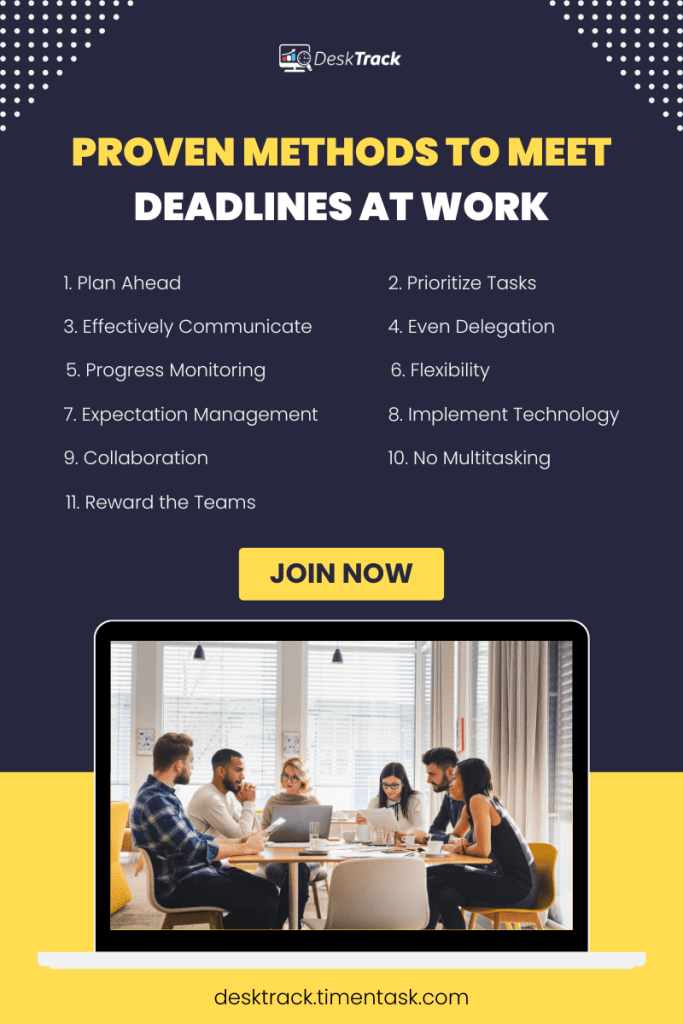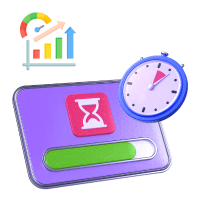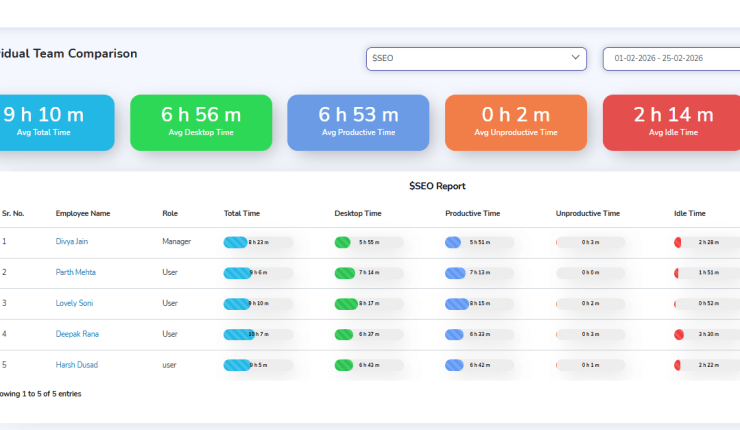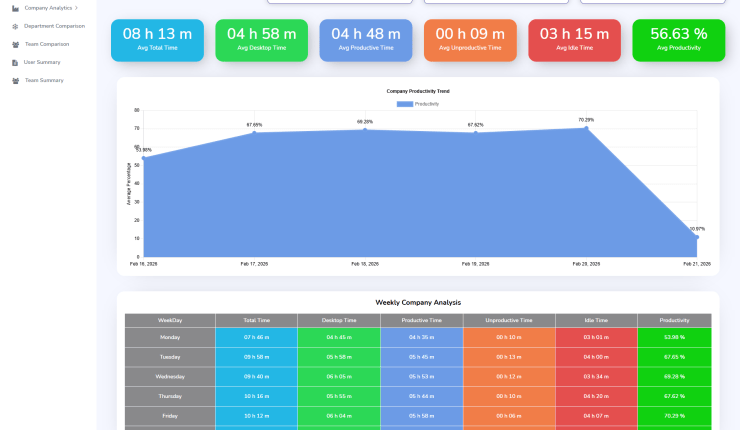Meeting deadlines is important for 2 things. Firstly, for the success of your project. Secondly, to satisfy your clients. Both of these are essential for the profitability of your business. However, on the other hand, even the slightest changes here will have a significant impact on all stakeholders. Overall, this results in project delays, missed opportunities, and damaged professional reputation for you.
Thus, you must implement proven strategies for consistently meeting timelines. So, today, we will discuss why it’s important, common challenges, and project solutions. However, first, what are deadlines?
What are Deadlines?
Deadlines are particular dates by which you are expected to finish a goal, project, or task. These serve as crucial project milestones or targets and provide you with a transparent work completion timeline. Here are a few more things you need to know.
- Different projects and tasks have varied deadlines.
- The duration relies on the task’s importance and priorities.
Read Also: Average Salary in Dubai: A Complete Guide
Importance of Meeting Deadlines at Work

The importance of meeting deadlines in the workplace goes far beyond completing projects and tasks. It’s crucial for business growth, ensuring streamlined work and maintaining productivity. Here’s why it is important for you and your teams to never miss deadlines.
1. Fulfill Expectations
If you assume deadlines to be informal contracts, then completing projects before them will be contract signing. Just saying. As you complete tasks on time, you build trust.
2. Keep the Project Flow Synchronized
Everyone is busy working on multiple projects. So, when you cause no delays, the overall planning and scheduling of the upcoming task stay in sync.
3. Track Progress
Effectively managing deadlines is great as an identifier to understand progress. You can easily foretell if you can meet the deadline or not.
4. Deadlines are Ice-Breakers
Communications are essential for your teams to start work. But to get started with the discussion, a deadline is the common platform. This helps in:
- Strengthening team relations
- Brainstorming innovation
- Fostering team motivation
Common Challenges in Meeting Deadlines
Make your workday more productive
Time tracking and work management can help you reach your goals
faster.
Fulfilling the work deadline can be a challenge for many businesses. There are many reasons causing delays that significantly affect project success. Below, we have compiled the common reasons why it happens.
- Poor Planning: Planning poorly at the initial stages of the project will always lead to missed tasks and unrealistic deadlines. Teams lose direction without transparent goals and fail to meet expectations.
- No Communication: Miss- or no communication leads to misunderstandings, causing delays.
- Poor Time Management: Without proper strategies for deadline management, even simple deadlines feel overwhelming.
- No Resources: Teams struggle to finish tasks without the right tools or the necessary team members with the required skills.
- Procrastination & No Motivation: Team members delay tasks because of overthinking, no accountability, or no motivation to meet deadlines.
- Multitasking: When team members simultaneously work on multiple projects, clashing priorities cause delays.
- Unrealistic Deadlines: Setting unrealistic expectations puts unwanted pressure on the team. Since your teams have not come across the How do you handle tight deadlines section, it will lead to burnout, mistakes, or missed deadlines.
Consequences of Missing Deadlines
Not knowing how to handle tight deadlines or any kind of timelines can have dire consequences for you. Firstly, it creates an insecure work environment and causes unwanted delays. When tasks pile up, your employees experience fatigue and become exhausted.
Not completing the projects on time brings multiple losses. Failure here brings a small issue, which sets off a chain reaction of related problems. It starts with:
- A bottleneck in your progress.
- Bottlenecks provide you and your teams with stress and issues.
- You will fail to reach your objectives.
- The above 3 things lead to you taking extra responsibilities.
- If other teams are also dependent on your work, their performance is also declined.
- Overall, it leads to adversely affecting your business’s functioning.
Read Also: Top 15 Business Expense Tracking Apps in 2025
11 Proven Methods to Meet Deadlines at Work

Finally, the section we were all here for is here. With all the negative parts now gone, we will help you gain the ability to meet deadlines. Here are the proven methods and strategies that we use to fulfill deadlines without filling our workdays with chaos.
1. Plan Ahead
Configure transparent project-wise objectives and goals. This makes it easier to subdivide the work into smaller tasks equipped with deadlines. This ensures that your teams stay on track to get the project wrapped up on time.
2. Prioritize Tasks
Before you can begin working, you need to know the critical tasks that require completion first. This helps you get a task frame to make better priorities and meet deadlines.
3. Effectively Communicate
Effective communication is the key for meeting deadlines and achieving project success. This ensures steady progress as your teams stay informed all the time. That’s all there is to it. Talk, talk, and talk. Taking out a few minutes to converse with your team members is much better than the regret of causing irreversible delays.
4. Even Delegation
Before assigning tasks to your team members, ensure that the right people will do the right tasks. You must know which among your human resources have the skills, experience, and capability to complete the tasks. Plus, ensuring that everyone understands their deadlines and responsibilities is key. Especially when your team is handling multiple projects.
5. Progress Monitoring
We are strongly against resorting to micromanagement for monitoring the progress of the project. Instead, use the best time tracking software to know how much time your employees are spending on each task. Integrate with the right project management software to streamline workflows as well.
6. Flexibility
All of us know that real-life projects are never rigid, sequential, or serial. Unexpected changes can occur at any time, for which you must be prepared. So, when you are scheduling or planning tasks, be flexible enough to adjust your timelines as needed.
7. Expectation Management
How can we expect deadlines to be respected if we don’t know how to manage expectations? Other than exception management, expectation management is also crucial. However, sometimes, expectations become overwhelming. That’s when you need to think practically and be realistic about what your teams can achieve within a given bracket.
8. Implement Technology
As we mentioned before, you need to implement the right technology, such as project management or time tracking software, to track work hours and streamline workflows. Plus, such solutions also provide features to automate tasks and optimize communication.
9. Collaboration
Intervene where you have to, let the teams work when everything is going smoothly, and even bring the knowledge, expertise, and skills of members from other teams and departments to meet the strict deadline. When it comes to project success, you mustn’t leave any stone unturned.
10. No Multitasking
As we mentioned before, multitasking results in clashing or competing priorities. This causes unnecessary delays. So, if you are keen on meeting deadlines, then encourage your employees to complete a task at a time.
11. Reward the Teams
To fulfill the project timelines or deadlines with more enthusiasm and have your teams put in the extra effort, recognize and reward them. Employees don’t expect much, but if you celebrate milestones with little treats such as pizzas and muffins, it adds to the overall satisfaction and motivation of your employees, which improves efficiency and productivity.
Use DeskTrack & Never Miss a Deadline Ever Again
Still having issues meeting deadlines? You need software assistance. DeskTrack’s project management, time tracking, and remote monitoring software for employees and teams make the job of deadline management much simpler for you. Here’s how DeskTrack ensures that you don’t miss deadlines.
- Configure due dates in tasks and track them in real-time
- Track progress in real-time with an auto timer
- Effectively delegate tasks by assigning users.
- Track and streamline workflows, and even track the time spent on various offline and online activities in real-time.
- Seamless integration with Slack for streamlined communication.
- Employees get notified whenever their managers create and assign a new task.
With DeskTrack, you will know who is working on what, when, and for how much as work happens. That too, from your single, user-friendly dashboard. How convenient. Isn’t it? Try now and realize why DeskTrack is the preferred workforce management software across 100+ nations.
Frequently Asked Questions (FAQ)
Q. What are Deadlines?
Ans. Deadlines are particular dates by which you are expected to finish a goal, project, or task. These serve as crucial project milestones or targets and provide you with a transparent work completion timeline.
Q. What is the Importance of Meeting Deadlines in the Workplace?
Ans. Managing deadlines helps to:
- Fulfill Expectations
- Keep the Project Flow Synchronized
- Track Progress
- Break the Ice
Q. What Does It Mean to Meet Deadlines?
Ans. To meet deadlines is to complete projects or tasks on or before the due date. These due dates are known as deadlines.
Q. What are the Ways to Meet Deadlines When Working Remotely?
Ans. When you and your teams are working remotely, you need to set clear goals, designate a workspace, and share a schedule to fulfill deadlines.
Q. How Do You Handle Tight Deadlines?
Ans. You should plan accordingly to ensure that there are no tight deadlines in the first place. However, in the worst case, your first step must be to inspire your teams to put in extra effort by promising and fulfilling a reward to increase success and trust. Secondly, you might also want to increase the no of human resources working on the project to ensure that there is no need for unnecessary overtime.



















